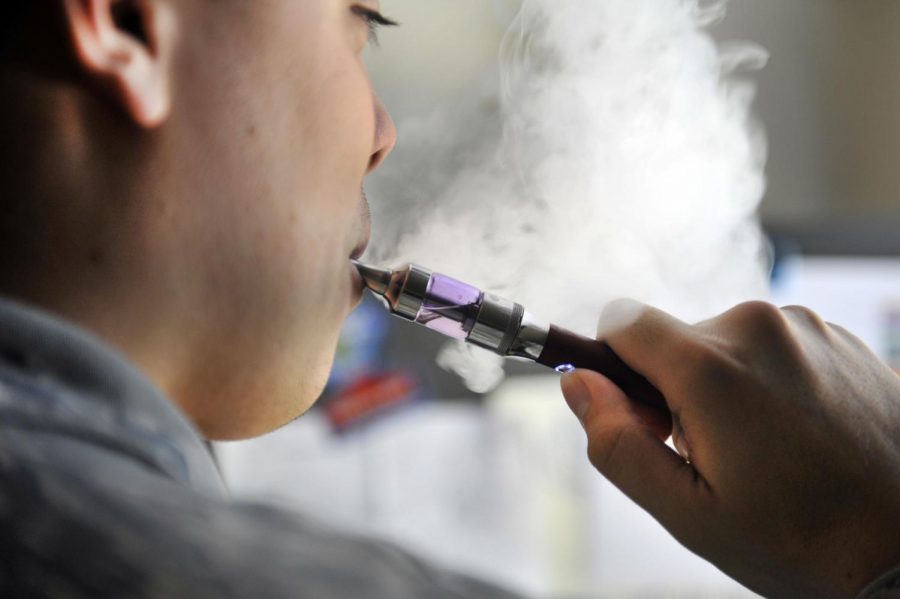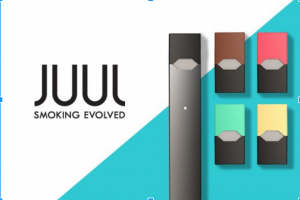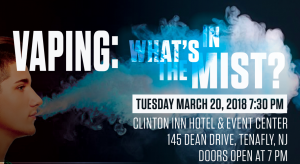FDA Hits Hard Against Teen E-Cigarette Usage
September 21, 2018
On Wednesday, September 12, the FDA released a press statement delineating steps to be taken to combat teenage e-cigarette use. The statement sought to warn some of the largest e-cigarette and vape companies against the illegal distribution of their products to minors. More than 1,300 letters were sent out warning JUUL and various other companies against the sale of their products to youths.
Of all of these products, JUUL is by far the most popular, consuming 54% of the market share of e-cigarettes by mid-2018, according to Wells Fargo Securities analyst Bonnie Herzog. The device itself is a sleek gray rectangle that resembles a flash drive and retails for $49.99. At the device’s head is a space for a ‘pod,’ an interchangeable capsule that yields as much nicotine as a pack of cigarettes. As a user draws on the head of the device, they inhale one of JUUL’s signature flavors, like mango, mint, or créme brulée, which seem to mislead teens into thinking these products are “kid-friendly.”
JUUL, however, adamantly denies that their device is meant for adolescents. Their website displays multiple warnings for proper use of their products. As stated on their website, “As scientists, product designers and engineers, we believe that vaping can have a positive impact when used by smokers, and can have a negative impact when used by nonsmokers. Our goal is to maximize the positive and reduce the negative. These alternatives contain nicotine, which has not been shown to cause cancer but can create dependency. We believe that these alternatives are not appropriate for people who do not already smoke.”
Despite assuring statements on the JUUL website, the FDA’s concern must mean serious health ramifications linked to these devices. According to the University of New Hampshire, nicotine has been linked to insulin resistance, chronic bronchitis, and lung disease. The transition from paper cigarettes to an e-cigarette device, however, usually proves beneficial to help quell the smoking habit without losing the nicotine buzz. Nicotine alone is far less damaging than traditional cigarettes, which increase risk of lung cancer, stroke, and heart disease, and account for almost a fifth of deaths in the United States, according to the Center for Disease Control and Prevention.
But just as with cigarettes, no number of negative statistics will stop adolescents from glamorizing the JUUL. “I’m aware of the negative effects of JUUL,” an anonymous student said, “but I just don’t really care that much.” Despite the discrepancy in safety between these two smoking options, it is generally unhealthy for anyone to develop a nicotine addiction. If JUULing becomes our generation’s cigarette smoking, today’s teens have far fewer killer chemicals to worry about—but that gap still doesn’t justify underage vaping.
In response to the FDA’s requests, the CEO of JUUL, Kevin Burns, said, “JUUL Labs will work proactively with FDA in response to its request. We are committed to preventing underage use of our product, and we want to be part of the solution in keeping e-cigarettes out of the hands of young people.”
Is the FDA right to limit e-cigs? Is it more important to prevent teenagers from developing nicotine addictions, or wean adults off the carcinogenic chemicals of cigarettes? Will e-cigarettes be more strongly regulated, or will the traditional cigarette industry go up in smoke?





















































































































































